Running an organization like SI4DEV which promotes research and evidence, I had been hearing from our partners who mostly operate at the grassroots about a type of substance abuse that many people in Nigeria were unaware of at the time: cough medicine abuse. Drug abuse among young adults has long been a challenge, with alcohol and marijuana abuse, leading the issue. However, through our partners, I became more informed about cough medicine abuse and how a lot of young people were spiraling down into vagrancy, prostitution and mental health issues because of codeine abuse.
Now, the codeine crisis in Nigeria is no longer a secret, both nationally and internationally, after the BBC aired a documentary on the issue. Award winning correspondent Ruona Meyer led an undercover team across several states to learn how codeine in cough syrup had become the street drug of choice, and the pipelines that helped the pinkish-red liquid flow from the pharmaceutical companies into the black market.
There appears to be a flourishing trade between pharma sales persons and drug dealers! Emzor, one of the major pharmaceutical companies in Nigeria was implicated on camera, with their representative boasting that he sold 1 million cartons of codeine cough syrup weekly. That would be a third of the shocking 3 million bottles asserted to be consumed by addicts in one week by the documentary.
What is not so shocking, to me anyway, is the government’s reaction to the issue. Some of us who had been following the news know that the Guardian and Vanguard and some other newspapers have all done stories on the issue in the last few months, though they could not be so detailed as they must hide a lot of information to keep their business from the big pharma and other commercial interests. The Pharmaceutical Society of Nigeria (PSN) had warned the government several times on this count. Yes, the danger was clear, but government chose to turn a blind eye.
Could it be that governments at all levels knew they have failed in their promises of change and rooting out corruption and waste? Where is the good governance and social investment programs assured to the people? Unemployment is the top challenge in all the communities where SI4DEV had carried our community needs assessment, so one doesn’t need to task the mind to understand why some youths turn to drug abuse.
Codeine is a respectable drug and many in the shrinking middle class will easily buy it over the counter to suppress the pains of hunger, unfulfilled dreams, hopelessness at the situation in the country at all levels, including the effects in homes with anger and pain channeled into intimate partner violence.
It’s unfortunate that BBC had to air the news before serious actions by relevant officials was taken but I’m of the opinion that better late than never. What I did not expect was the totally over-sized and ill-thought response. I’m referring to the ban of codeine imports into the country and the shut-down of all three pharma companies referenced in the BBC documentary.
After a discussion with the SI4DEV Health Leaders group, the consensus was that the ban placed by the government would not do much to curtail the abuse, and in some cases will exacerbate the problem.
1. Such a ban will give rise to production of fake Codeine syrup which will be in circulation underground and these fake syrups may be more hazardous than codeine because they could have mixed in other hard drugs.
2. Traders who already are in possession of codeine syrup inventories will go underground and will become security conscious, making it even more difficult for them to be apprehended by police or NDLEA.
3. Closing the 3 pharma companies was an unnecessary heavy blow that will negatively affect the economy and productivity while not having much influence on preventing drug abuse.
NAFDAC and the ministry of Health, the two agencies of government that responded to the BBC documentary overnight have not been able to answer why these fire-brigade approach to their regulatory functions. Over the past two years as the drug abuse blazed into a conflagration, claiming and destroying lives, both agencies denied Nigerians any well thought out plans to educate on the dangers of drug abuse and investigate the manufacture and distribution of codeine cough syrup into and around the country.
It is no shock to me because our leaders have only two responses in their repertoire – pretend ignorance of a problem or come up with hastily cobbled solutions. We often take unnecessary steps on issues in Nigeria, and one of the things we cultivate in SI4DEV leaders is critical thinking and an evidence-based approach. The way a leader handles issues is a window into what the planned outcomes will be.
May is Mental Health Awareness Month and at SI4DEV, we plan to key into that to launch a campaign that will bring even more attention to the dangers of codeine and general drug abuse. Some of our strategies include:
1. INTERNAL TRAINING – Some of our partners are still not sure of the ramifications of drug abuse, and we start internally to educate ourselves before we can properly educate others. We will get a subject matter expert each week to host ask me anything Tuesday and try to learn the adverse effects of drug abuse including mental health issues. Subsequently, we will create a more diverse campaign from there to encompass social media hashtags, uploading training and resources on our website and reaching out to health NGOs or rehabilitation centers for partnership.
2. POLITICIAN PLEDGE CARDS – We will to pay advocacy visit to our political leaders to inform them in more detail about this menace and get their commitment. They will sign Pledge cards saying their party house will not be used as a center for drug abuse, because even if we hold campaigns these drugs are peddled in party house and other primary schools in town.
3. SCHOOL-BASED DRUG FREE CLUBS – There is a need to revive drug free clubs in secondary schools and plant new ones where they are missing. We will partner with NGOs that work in these areas, and also seek permission from colleges, polytechnics and universities to set up peer sessions and training on drug abuse.
4. MEDIA APPEARANCES – Work with the media in various ways including press briefings, talk shows and question and answer sessions on drug abuse among the youth in Nigeria. During these media parleys, we will highlight the bills currently going through the national assembly as a best practice model.
5. NDLEA COLLABORATION – We will pay an advocacy visit to the NDLEA offices across the country to commend them for their good work and see how we can support and also get their participation during press briefing and other lectures we plan to hold.
6. NATIONAL CONFERENCE – In conclusion, we will organize a conference on SAY NO TO DRUGS, inviting role models, key persons as well as security operative such as NDLEA, Police, Military and even customs, State social welfare etc.
The Strategy and Innovation for Development (SI4DEV) Initiative is an NGO registered in Nigeria to empower community leaders working towards a country where every citizen has fair access to the resources needed to achieve their full potential. SI4DEV currently supports over 100 community leaders to improve the education, economic and health attainment of their communities. SI4DEV is an affiliate organization of The Spring Development Initiative – a US-based charitable organization.
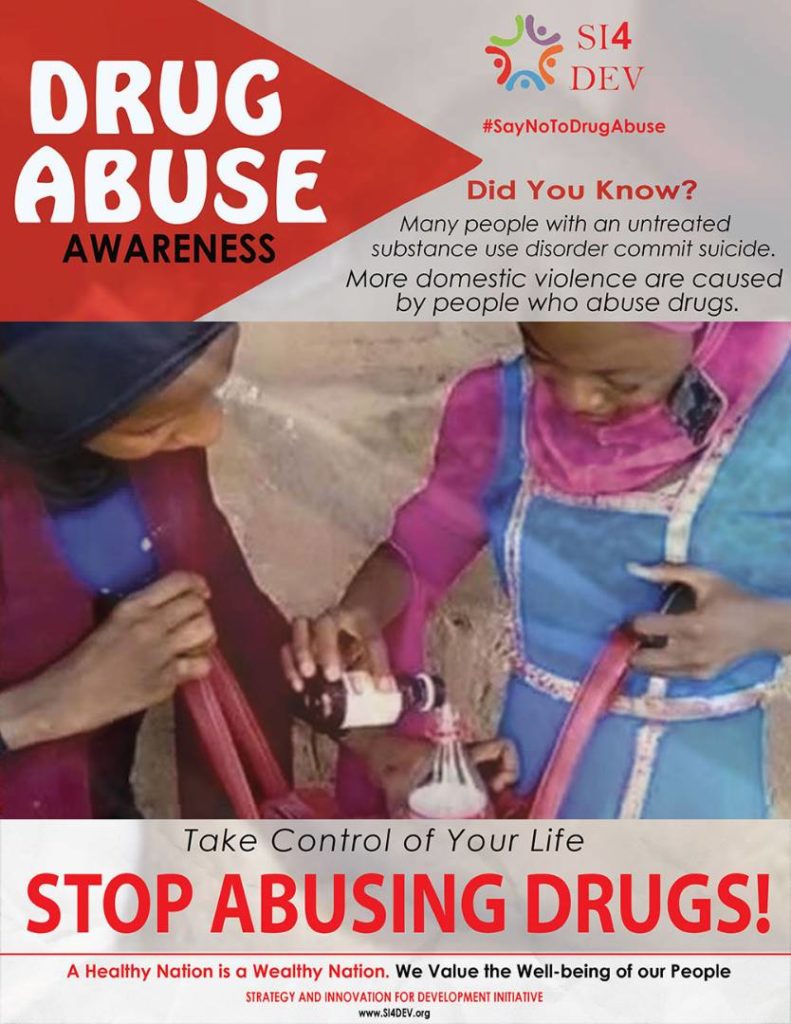
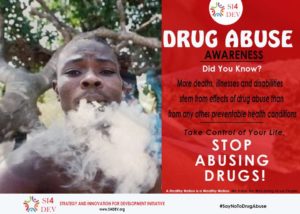
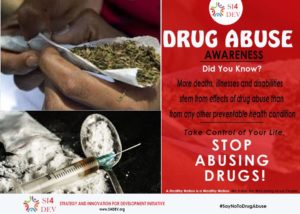
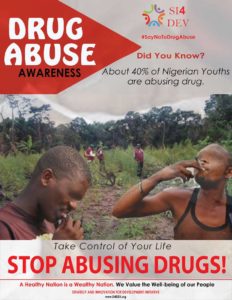
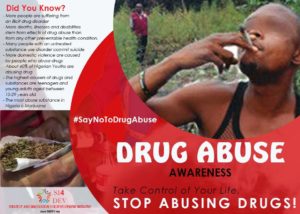
Our government has to adopt a systematic approach in addressing issues. I quite agree with you that the ban of codeine is not the solution.
That’s true
Good point too!
There should be serious campaign for this…..
Campaign against drug abuse need to be taken seriously.
Kudos to d late Dora Akunyili. Government should be alive to their duties. It’s well.
Exactly
And that is why we need people like her again!
The ban on Codeine will not stop its circulation. Rather, the sellers will hide under the ban and make more profit from the users. The government has simply subjected the sales of Codeine to racketeering.
But let’s be optimistic about it
U are very correct.
This is a good one. Kaduna location group will be kicking off her own campaign very soon as this menace in the form of cancer that is gradually eating deep into our society must be cut off
We are ready to start working on that
Yes sir
We have to team Kaduna. And we have to strategically select the location for this project.
Well done on this report. all stakeholders must work together to fight this national menace.
That’s right
This campaign will go a long way in educating the public and that’s what we aspire to do as partners. I really commend this write up by Admin as it covers all the crucial grounds as regard how best to tackle the issue of Drug Abuse. I look forward to this project.
Honestly
Nigeria is turning into something Else, the way out are young youth are into drugs, something need to be done, and I thick this is the right step to take, enlightenment is one solution to the problem.
Nice publication. We are all in for this.
Very nice
We are ready for the movement.
Yes we will support the movement
Very very thoughtful…
Yeah
Nice job! because this is the worrisome issue confronting our Youths
Absolutely, and we need to tackle it at all costs
Good work. Please we can all start from our home. We are all leaders one way or the other. Those around you, educate them more about the danger of substance abuse. Keep it up admin!
That’s very true
From a popular Yoruba quote, beheading is not the solution to headache. Banning this drugs I don’t believe is solution. There are several means of abusing drugs which are obtainable around us.
Not until you uproot a tree, there is still high chances for that same tree to sprout again.
Well said my brother
Let’s act now
Well organised and said. Kudos to u.
Unnecessary prescription of tramadol for pain management accross all level of health care system could be another focus area requiring intervention.
I think we need to act on this as soon as possible.
Drugs and substance abuse has been a major problem in the society, not only in Nigeria but also in the rest of the world. This has been brought about by peer pressure, lack of proper information on the negative effects on drugs and substance abuse and ignorance among those who get themselves indulged in this vice. Also in one way or the other poverty has contributed to this.
Yea.. Nice publication..
Yes.
Though codine is legally ban, however what effort has the government make to ensure old stock at pharmacy and chemist is not going to be sold codedly to the users. I want to agree that banning is not just enough, monitoring of drugs outlet to ensure old stocks are not sold behind the ban should be intensify.
The ban is officially done but the codeine is a content in the syrup that causes this mayhem.
Yes
Indeed we need to take action.
A workable action plan that must be followed through till there is a tangle result that is formed into a system and monitored till it becomes part of the people.
Yes, we to really take action.
The main problem is the public, let’s try and change their mindset about drugs.
Thanks for the extensive research,all hands must be on Deck,to educate me he younger generation on the effect of drug abuse
We all need to come together, for the fight against negative effects of drug abuse
It is a combine effort from a stage of the society from the young man in the street to the one sitting in government to even those in the religion arena.
Well articulated
Sensitization and Reorientation is key towards tackling this menace in our society. Way to go SI4DEV
Form my own point of view I think banding it will reduce the use of it but definitely will not stop it. Cause right here in the street they believe its a spiritual something some and even prefer it to food. And the way they run their thing if u band it they will look for other means necessary to get high.
Well said brotherly, I couldn’t have agreed less
Yes.
Well said.
Our youths need help
Good point